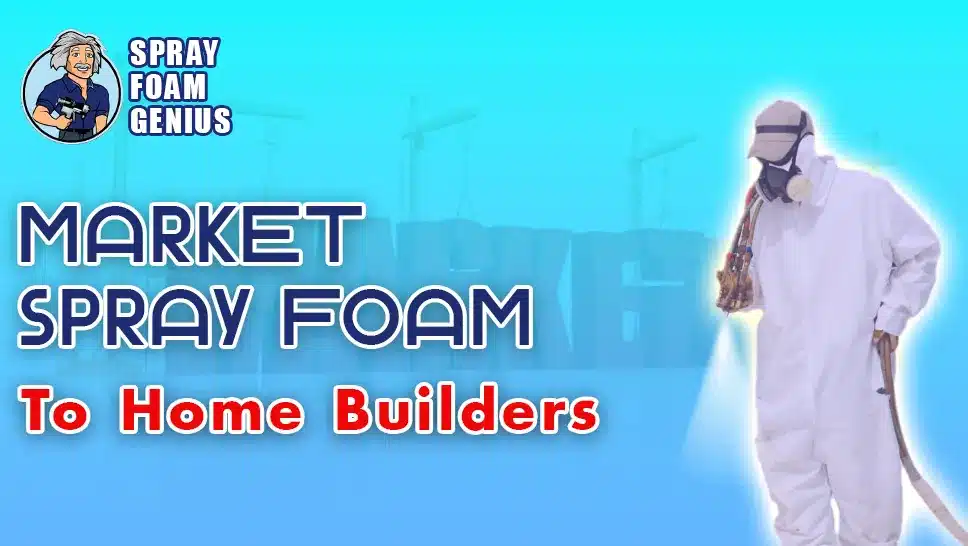
Marketing spray foam insulation to home builders requires a specialized approach that integrates industry knowledge, targeted strategies, and effective communication. At Spray Foam Genius Marketing, we provide expert marketing services specifically for spray foam insulation contractors across the USA and Canada. Our goal is to help you connect with home builders and establish your brand as the go-to solution for high-performance insulation. In this guide, we’ll explore practical strategies for marketing spray foam insulation, from understanding your market to executing targeted campaigns.
Understanding the Market
The Growing Demand for Spray Foam Insulation
Spray foam insulation has witnessed a surge in popularity due to its impressive performance and energy efficiency. Home builders are increasingly adopting spray foam insulation to meet stringent energy codes and deliver high-quality homes. This growing demand is driven by several factors:
- Energy Efficiency: Spray foam insulation provides a superior thermal barrier compared to traditional insulation materials. This efficiency translates into lower energy bills and a more comfortable living environment.
- Environmental Concerns: With increasing awareness about environmental sustainability, spray foam insulation offers benefits such as reduced air leaks and better energy conservation, which aligns with eco-friendly building practices.
- Innovation in Building Standards: As building codes evolve to emphasize energy efficiency and sustainability, spray foam insulation is becoming a preferred choice for meeting these new standards.
Key Challenges Faced by Home Builders
When marketing to home builders, it’s essential to address their specific challenges:
- Energy Efficiency Requirements: Builders are required to meet rigorous energy performance standards. Highlight how spray foam insulation can help them achieve these standards efficiently.
- Cost Considerations: The initial cost of spray foam insulation can be higher than other materials. Emphasize the long-term savings and benefits, such as reduced energy costs and increased property value.
- Material Performance: Builders need assurance about the reliability and durability of insulation materials. Showcase data and case studies that demonstrate the proven performance of spray foam insulation over time.
Crafting a Winning Marketing Strategy
Identify Your Target Audience
To effectively market spray foam insulation, you need to identify and understand your target audience. Key segments to consider include:
- Residential Builders: These builders focus on single-family homes, multi-family units, and custom homes. They are likely to be interested in the benefits of spray foam insulation for enhancing home comfort and energy efficiency.
- Commercial Builders: This segment includes those working on office buildings, retail spaces, and industrial facilities. Emphasize the advantages of spray foam insulation in large-scale projects where performance and energy efficiency are critical.
- General Contractors: Contractors who manage various construction projects are key decision-makers. Highlight how spray foam insulation can streamline their projects and provide superior performance.
Develop a Unique Selling Proposition (USP)
Your Unique Selling Proposition (USP) is crucial for differentiating your spray foam insulation from competitors. Your USP should clearly articulate the unique benefits of your product, such as:
- Energy Efficiency: Spray foam insulation is renowned for its superior thermal performance. Emphasize how it helps builders meet energy codes and reduce energy costs for homeowners.
- Durability and Longevity: Highlight the long-lasting nature of spray foam insulation. Unlike traditional materials, it does not settle or degrade over time, ensuring consistent performance.
- Air Quality Improvement: Point out how spray foam insulation enhances indoor air quality by minimizing air leaks and moisture buildup, contributing to a healthier living environment.
Create Engaging Content
Content marketing is a powerful tool for engaging with home builders and showcasing the benefits of spray foam insulation. Consider creating the following types of content:
- Educational Blog Posts: Write articles that address common questions and concerns about spray foam insulation. Topics could include “The Top Benefits of Spray Foam Insulation for New Home Builds” or “How Spray Foam Insulation Can Reduce Energy Costs.”
- Case Studies and Testimonials: Share success stories from other builders who have used spray foam insulation. Include project details, the challenges faced, and the benefits realized. Real-life examples can build trust and demonstrate the value of your product.
- How-to Guides and White Papers: Develop comprehensive guides and white papers that provide valuable insights into the installation and benefits of spray foam insulation. These resources can establish your company as a knowledgeable leader in the field.
Utilize SEO and Local SEO
Search Engine Optimization (SEO) is essential for improving your online visibility and attracting home builders to your website. Here are some key SEO strategies to implement:
Keyword Optimization
Incorporate relevant keywords into your website content, blog posts, and other marketing materials. Primary keywords to target include “spray foam insulation for home builders” and “energy-efficient insulation solutions.” Use secondary and LSI (Latent Semantic Indexing) keywords to add depth and context, such as “insulation materials,” “home building insulation,” and “spray foam benefits.”
On-Page SEO
Optimize your website’s on-page elements, including title tags, meta descriptions, headers, and image alt texts. Ensure that each page is optimized for both primary and secondary keywords, and that content is well-structured and easy to read.
Local SEO
For spray foam insulation contractors, local SEO is particularly important. Make sure your business is listed on Google My Business and other local directories. Optimize your Google Business Profile with accurate information, including your address, phone number, and business hours. Encourage satisfied clients to leave positive reviews to enhance your local reputation and attract more home builders in your area.
Leveraging Online Advertising and Lead Generation
Pay-Per-Click (PPC) Advertising
PPC advertising can drive targeted traffic to your website and generate leads. Use platforms like Google Ads to create campaigns targeting keywords related to spray foam insulation and home building. Craft compelling ad copy that highlights the unique benefits of your product and includes a strong call to action. Monitor and adjust your campaigns based on performance data to maximize results.
Social Media Advertising
Social media platforms such as LinkedIn can be valuable for reaching homebuilders and industry professionals. Create targeted social media campaigns to increase visibility and engage with potential clients. Share informative content, success stories, and industry updates to build your brand and establish credibility.
Email Marketing
Email marketing allows you to stay connected with potential clients and nurture leads. Segment your email lists to send targeted messages to home builders, highlighting new content, special offers, and updates about your services. Use personalized and engaging email campaigns to build relationships and encourage conversions.
Building Relationships with Home Builders

Networking and Industry Events
Attending industry events, trade shows, and networking opportunities can help you build relationships with home builders and establish your company as a trusted partner. Use these events to showcase your products, engage with potential clients, and stay updated on industry trends.
Partnerships and Collaborations
Forming partnerships with other businesses in the home-building industry can help you reach a broader audience. Consider collaborating with architects, real estate agents, or construction supply companies to create mutually beneficial relationships and expand your network.
Measuring and Optimizing Your Marketing Efforts
Track Key Metrics
To evaluate the effectiveness of your marketing strategies, track key metrics such as:
- Website Traffic: Monitor the number of visitors to your website and their behavior. Analyze traffic sources, page views, and user engagement to identify areas for improvement.
- Lead Generation: Measure the number of leads generated from various marketing channels, including SEO, PPC, and social media. Assess the lead quality and conversion rates to determine the effectiveness of your campaigns.
- Conversion Rates: Track the percentage of leads that convert into clients. Analyze the conversion process and identify any obstacles that may be affecting performance.
Analyze and Adjust
Regularly analyze your marketing performance to identify successful strategies and areas for improvement. Use tools like Google Analytics to gain insights into your marketing efforts and make data-driven decisions. Adjust your strategies based on performance data to optimize results and achieve your marketing goals.
Elevate Your Business Today
Marketing spray foam insulation to homebuilders requires a strategic approach that combines industry knowledge, targeted tactics, and effective communication. By understanding the market, crafting a compelling USP, and leveraging various marketing strategies, you can successfully promote your spray foam insulation products and establish your brand as a leader in the industry.
At Spray Foam Genius Marketing, we specialize in helping spray foam insulation contractors optimize their marketing efforts and achieve their business goals. If you need assistance with SEO, lead generation, or any other aspect of your marketing strategy, don’t hesitate to contact us at 877-840-FOAM for USA and 844-741-FOAM for Canada, visit our website at https://sprayfoamgeniusmarketing.com/, or email us at [email protected].
We’re here to help you succeed!
- How to Use Pinterest to Market Your Spray Foam Insulation Services - December 27, 2023
- How to Use LinkedIn to Grow Your Spray Foam Insulation Business - December 23, 2023
- How to Use Instagram to Showcase Your Spray Foam Insulation Projects - December 16, 2023

